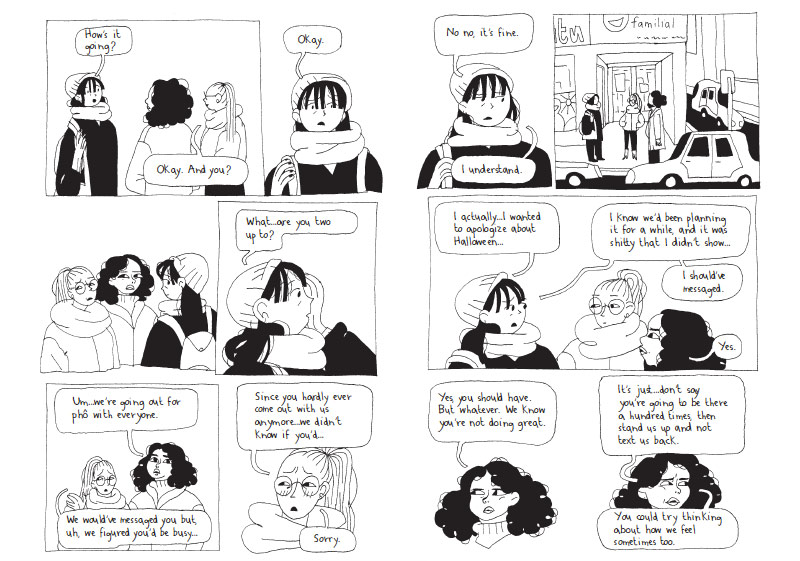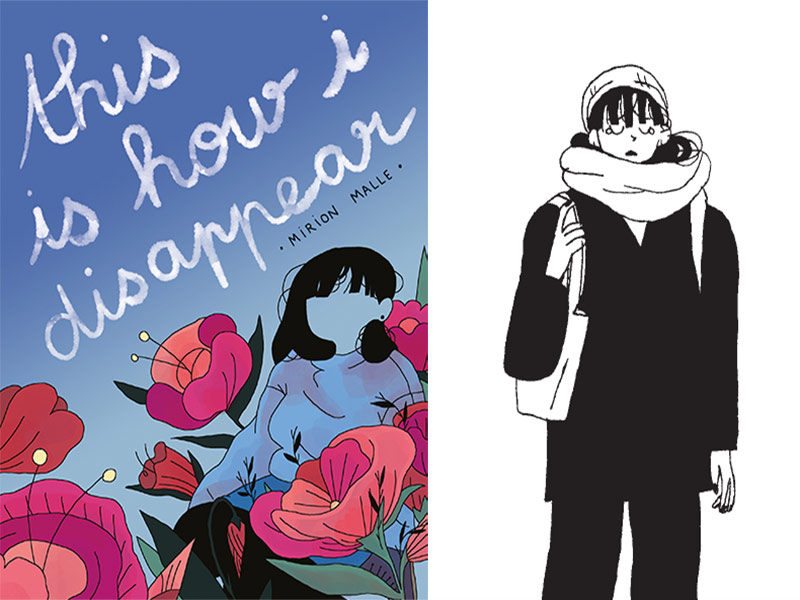It’s a hard time to be a young woman. But was it ever easy?
Montreal-based Mirion Malle’s graphic novel This Is How I Disappear tells the story of a young woman named Clara. Like many people in their 20s, Clara is very much in the process of trying to figure things out. Her job at a publishing house is unrewarding, her boss is a dickhead and, in addition to all of the ordinary struggles of life, she is dealing with a serious depression stemming from a past sexual assault.
Translated from French by Aleshia Jensen and Bronwyn Haslam, the narrative unfolds in closely observed vignettes of hangout sessions with friends, long workdays and periods of profound loneliness and isolation. Faced with trying to finish her poetry manuscript, Clara is also beset with crippling writer’s block.
This all might sound bleak, but Malle’s compassion and trust in her characters imbues the story with surprising resiliency and spots of bright joy. Friends are pivotal in helping Clara not only cope, but also move forward with tenacity and hope for the future. A good therapist is helpful too.
The Tyee asked Malle about her work and the struggles that younger generations contend with today. The interview has been lightly edited for length and clarity.
The Tyee: Do you feel that the problems young women face today are even more complex than those of previous generations?
Mirion Malle: I honestly don’t know. I don’t think it is a stake of “who suffered most because of patriarchy,” because the truth is that women always suffered, sometimes in the same ways in different times, sometimes in different ways.
It’s very complex and should not be generalized, but maybe we can try to see how we suffered and how we are suffering right now, with our different profiles and different stories.
Given Clara’s ability to offer compassion and understanding to others, why do you think it is so difficult for her to extend those same qualities to herself?
She is harder on herself than with other people, and I think it’s something true of a lot of people. Especially as women, society teaches you from a very young age to not be compassionate towards yourself, to be very strict and demanding of yourself, and Clara is doing exactly that.
At the beginning of the story, she refuses to look at her wounds, she tries to pass over them, to continue to function as if nothing is happening. But as the story goes on it is more and more difficult, and she is breaking apart until she accepts and gives herself the time and space to expose her feelings.

Do you feel that communities of young people offer each other a different kind of support that institutions like the medical and counselling professions do not?
Yes, even if I am not sure it is a “young people” thing. Communities are always important and are always providing some kind of support. But they are not a replacement for health care, and mental health care. The problem is that, in our society, health is seen as a privilege and not a basic need and right, and maybe especially mental health, and therefore it is extremely difficult and most of the time very expensive to receive care.
The degree of intimacy and unflinching honesty with which the story is told makes it feel very personal. How have readers reacted to this level of truth?
I have received lots of wonderful and heartwarming messages from readers saying they connected with Clara’s story, even when their own story was not exactly the same. I was deeply moved each time and felt very lucky and privileged that people trusted me to send me those very personal messages, sharing their emotions and what the book made them feel. I am always very impressed by the strength they have and admire them deeply.
Have you received feedback from readers that surprised you?
Well, I was very relieved that people read my book, because I was very afraid it was maybe going to be a flop!
Given that this is a particularly anxious period in human history, where do you locate sources of hope and resilience?
Definitely in community, for me especially in lesbian and queer communities; in friendship, love, care and support, in kindness and in strength, in anger and in activism. In people being there for each other and trying to do good for each other.
In art and those communities inventing new stories, new kinds of imagination. I also watch a lot of cute animal videos. I’m pretty basic! ![]()
Read more: Health, Art, Gender + Sexuality, Media
















Tyee Commenting Guidelines
Comments that violate guidelines risk being deleted, and violations may result in a temporary or permanent user ban. Maintain the spirit of good conversation to stay in the discussion.
*Please note The Tyee is not a forum for spreading misinformation about COVID-19, denying its existence or minimizing its risk to public health.
Do:
Do not: